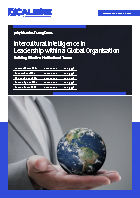| Date | Venue | Fee | |
|---|---|---|---|
| 18 May - 22 May 2026 | Dubai – UAE | $ 5,950 | Register Now |
| 06 Jul - 10 Jul 2026 | London - UK | $ 5,950 | Register Now |
| 02 Nov - 06 Nov 2026 | Dubai – UAE | $ 5,950 | Register Now |
| 21 Dec - 25 Dec 2026 | London - UK | $ 5,950 | Register Now |
| 04 Jan - 08 Jan 2027 | Dubai – UAE | $ 5,950 | Register Now |
About the Course
Appreciating and respecting cultural differences is essential for fostering a cohesive work environment, driving innovation, and achieving organisational success. When leaders embrace diverse perspectives, they create an inclusive atmosphere where all employees feel valued and empowered to contribute their unique ideas and experiences. This inclusivity enhances team dynamics and encourages creativity, leading to innovative solutions that can address complex business challenges. A culturally aware workforce is better equipped to navigate global markets. This ensures that organisations can effectively engage with clients and partners from various cultural backgrounds, ultimately driving long-term success and sustainability.
Intercultural intelligence encompasses a deep understanding of how cultural backgrounds influence behavior, decision-making, and interpersonal interactions. Leaders with solid intercultural intelligence can bridge gaps between individuals from different cultures, fostering a culture of inclusivity and collaboration. This 5-day interactive Intercultural Intelligence in Leadership within a Global Organisation training course aims to equip leaders with the necessary skills to lead effectively in multicultural settings, ultimately enhancing their ability to manage diverse teams and drive organisational goals. It will give delegates the tools to recognise their cultural biases and develop strategies for effective cross-cultural communication, enabling them to lead with empathy and understanding. By enhancing their intercultural intelligence, leaders will be better positioned to navigate the complexities of global business environments and cultivate a more engaged and productive workforce.
As organisations strive to remain competitive in a rapidly evolving marketplace, the demand for interculturally competent leaders is more significant than ever. This training program will enhance delegates' leadership capabilities and empower them to create a more inclusive workplace that values diversity and leverages the unique strengths of all team members. By investing in the development of intercultural intelligence, organisations will foster a culture of innovation and resilience, ensuring they are well-equipped to meet future challenges. Delegates will leave with actionable insights and a deeper understanding of how to lead effectively in a globalised world.
Core Objectives
By the end of the training course, delegates will be able to:
- Understand the key concepts and importance of intercultural intelligence in leadership within a global context
- Analyse the impact of cultural differences on communication styles and leadership effectiveness
- Evaluate personal cultural biases and their effects on decision-making and team dynamics
- Apply strategies for effective cross-cultural communication to enhance team collaboration
- Develop skills for resolving conflicts that arise from cultural misunderstandings within diverse teams
- Develop action plans to foster inclusivity and leverage the strengths of a multicultural workforce
- Lead initiatives that promote intercultural awareness and competence throughout the organisation
Training Approach
This is a blended interactive lecture, group discussions, and experiential training course that will let the delegates actively engage with role-playing scenarios and simulations to practice intercultural communication and conflict resolution skills in real-world contexts. Additionally, reflective exercises and self-assessments will be incorporated to promote personal growth and enhance delegates' understanding of their cultural biases and leadership styles.
The Attendees
This training course represents a diverse group of professionals who play crucial roles in shaping organisational culture and driving leadership effectiveness. These leaders will enhance their intercultural competence, enabling them to foster collaboration and innovation within their multicultural teams.
But, it will be valuable to the professionals but not limited to the following:
- Senior Executives
- Middle Management Leaders
- Team Leaders and Supervisors
- Human Resources Professionals
- Diversity and Inclusion Officers
- Project Managers
- Training and Development Coordinators
- Cross-Functional Team Members
- Organisational Development Specialists
- International Business Managers
Daily Discussion
DAY ONE: UNDERSTANDING INTERCULTURAL INTELLIGENCE
- Defining Intercultural Intelligence and Its Importance
- The Role of Culture in Leadership
- Dimensions of Culture – Hofstede’s Cultural Dimensions Theory
- Self-Awareness in Intercultural Interactions
- Recognising and Overcoming Cultural Biases
- The Impact of Globalisation on Leadership Practices
- Developing a Mindset for Intercultural Competence
DAY TWO: EFFECTIVE COMMUNICATION ACROSS CULTURES
- Verbal and Non-Verbal Communication Differences
- Language Barriers and Their Impact on Leadership
- Active Listening in Cross-Cultural Contexts
- Strategies for Clear and Respectful Communication
- Navigating Cultural Differences in Feedback
- Adapting Communication Styles to Diverse Audiences
- Building Rapport in Intercultural Settings
DAY THREE: LEADING DIVERSE TEAMS
- The Benefits of Diversity in Leadership
- Understanding Team Dynamics in Multicultural Environments
- Strategies for Building Cohesive Teams Across Cultures
- Conflict Resolution in Diverse Teams
- Enhancing Collaboration Through Cultural Awareness
- Fostering Inclusion and Belonging in the Workplace
- Cultural Norms and Values in Team Interactions
DAY FOUR: DECISION-MAKING IN A GLOBAL CONTEXT
- Cultural Influences on Decision-Making Styles
- Balancing Local and Global Perspectives in Leadership
- Ethical Considerations in Intercultural Decision-Making
- Collaborative Decision-Making Across Cultures
- Managing Risk in Global Operations
- Integrating Diverse Perspectives into Strategic Planning
- Evaluating Outcomes of Intercultural Decisions
DAY FIVE: DEVELOPING INTERCULTURAL LEADERSHIP SKILLS
- Identifying Personal Leadership Styles in a Global Context
- Building Emotional Intelligence for Intercultural Leadership
- Creating a Personal Development Plan for Intercultural Competence
- Strategies for Continuous Learning and Adaptation
- Mentoring and Coaching Across Cultures
- Leading Change in Diverse Environments
- Setting Goals for Intercultural Leadership Growth
Certificate Awarded
Upon successful completion of this training course, participants will be awarded a Certificate of Completion from XCalibre Training Centre, acknowledging their accomplishment. This certificate serves as a testament to their dedication to developing their skills and advancing their expertise in their respective fields.



